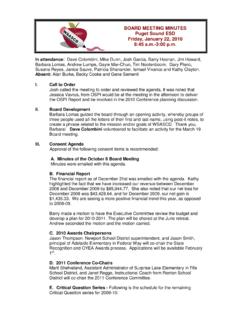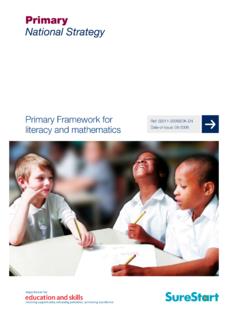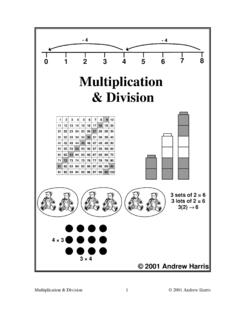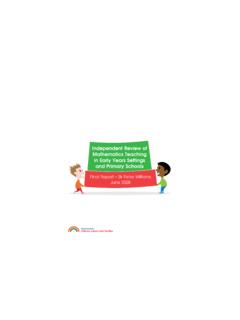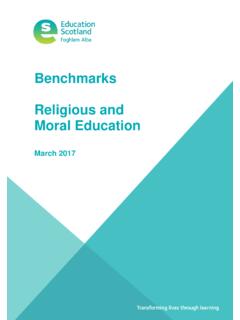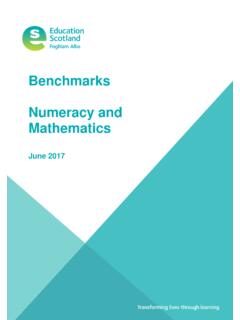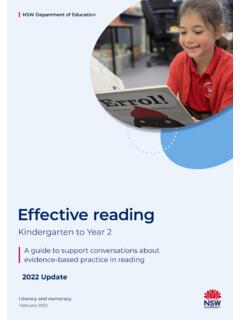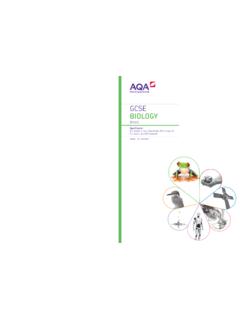Transcription of The Importance of Early Numeracy Skills - WSASCD
1 The Importance of Early Numeracy SkillsWashington State ASCD Conference15 October 2010 Julie WagnerElementary mathematics SpecialistOSPII ntroductions Introduce yourself, tell us what you do, and give us one word you would use to describe young preschool To review recent research on Early Numeracy and what it suggests To learn about Early Numeracy concept trajectoriesWhy Numeracy Skills ? Want children prepared for school Changing times and economic need Ticket to a sustainable job Ability to persevere in problem-solving, reason abstractly and quantitatively, construct viable arguments and critique the reasoning of others Predicts later achievementThe Piaget problem Until children can conserve number, counting is meaningless.
2 To understand counting, must understand that each number includes those that came before. Students have to produce number words in sequence and sequence the objects they count so each object has exactly one count. Much can be learned about counting and number before this is mastered. Adapted from Learning and Teaching Early Math: The Learning Trajectories Approach-Clements & Sarama -2009 Partial result of Piaget Emphasis in Early years away from mathematics and towards a strong literacy does the research say?A meta-analysisSchool Readiness and Later Achievement, Duncan, et al, Developmental Psychology, strongest predictors of later achievement are school-entry math, reading, and attention Skills . Early math Skills have the greatest predictive power.
3 By contrast, measures of socio-emotional behaviors were generally insignificant predictors of later academic performance, even among children with relatively high levels of problem does this work? What Numeracy Skills children know when they enter kindergarten and first grade predicts their mathematics achievement for years to come. What they know in math predicts their readingachievement what about literacy? Early knowledge of literacy predicts later reading ability, but that s all. Since Numeracy Skills predicts later mathandlater reading ability, mathematics appears to be a core component of cognition. Learning and Teaching Early Math: The Learning Trajectories Approach Clements and Sarama -2009 What does the research say?
4 Review of researchMathematics Learning in Early Childhood: Paths Toward Excellence and Equity, national Research Council, committee found that, although virtually all young children have the capability to learn and become competent in mathematics , for most the potential to learn mathematics in the Early years of school is not currently realized. This stems from a lack of opportunities to learn mathematics either in Early childhood settings or through everyday activities in homes and in preschool child Natural curiosity about everything As Early as 18 months, children begin recognizing geometric shapes and develop systems for locating objects in space. Very Early in life, have a limited ability to discriminate sets of different sizes from each other ( 2 versus 3), develops this skill for larger sets over time From an Early age, understand the concept of addition and subtraction If children can learn tyrannosaurus rex , they should have no problem with hexagon or symmetrical.
5 Adapted from mathematics Education for Young Children: What IT IS and How to Promote It, Ginsburg, Lee, Boyd, The preschooler s brain Innate number sense Brains develop most when challenged with complex activities and not with rote learning Preschoolers do not perceive situations, problems, or solutions the same way adults do Young students do not see the world as separate subject from How the Brain Learns mathematics , David A Sousa, 2008 Review of researchMathematics Learning in Early Childhood: Paths Toward Excellence and Equity, national Research Council, committee found that, although virtually all young children have the capability to learn and become competent in mathematics , for most the potential to learn mathematics in the Early years of school is not currently realized.
6 This stems from a lack of opportunities to learn mathematics either in Early childhood settings or through everyday activities in homes and in children s daycare Center-based Head Start Child care centers Family child care homes Friends and familyWhat does the research say?Article by NCTM President A Missed Opportunity: mathematics in Early Childhood, Henry Kepner, NCTM Summing Up, February to kindergarten, many children have the interest and capacity to learn meaningful math and acquire considerable mathematical knowledge. Many Early childhood programs do not extend children s mathematical knowledge. Instead, they have these young students repeat the same tasks in varied settings without posing challenges that would push them to the next makes for high quality mathematics in Early childhood?
7 Does not involve pushing Early elementary arithmetic onto younger children. Allows children to experience mathematics as they play in and explore the world. Observing the child and asking guiding questions that help them build their knowledge along a does the research say?Social policy reportMathematics Education for Young Children: What It Is and How to Promote It, Ginsburg, Lee, & Boyd, Society for Research in Child Development, 2008. Cognitive research shows that young children develop an extensive everyday mathematics and are capable of learning more and deeper mathematics than usually assumed. Typically, Early childhood educators are poorly trained to teach mathematics ,are afraid of it, feel it is not important to teach.
8 And typically teach it badly or not at educational requirements for lead teachers in state-funded Pre-K Bachelor s Degree with training or certification in Early childhood education 20 states Bachelor s degree with training or certification in Early childhood education in certain settings only 8 states Bachelor s degree without training or certification in Early childhood education 2 states Training or certification in Early childhood education 9 states High school diploma 1 state No state-funded pre-k program 10 statesResearch demonstrates that teachers with training in Early childhood development are better equipped to facilitate young children s language-, cognitive-and social- Skills policy reportMathematics Education for Young Children: What It Is and How to Promote It, Ginsburg, Lee, & Boyd, Society for Research in Child Development, 2008.
9 Cognitive research shows that young children develop an extensive everyday mathematics and are capable of learning more and deeper mathematics than usually assumed. Typically, Early childhood educators are poorly trained to teach mathematics ,are afraid of it, feel it is not important to teach, and typically teach it badly or not at mathematics ! Many teachers avoid teaching mathematics because of their own negative Early experiences with to your neighbor Step 1: Find a partner. Step 2: Take a few minutes for each person to share a personal story related to a math experience during policy reportMathematics Education for Young Children: What It Is and How to Promote It, Ginsburg, Lee, & Boyd, Society for Research in Child Development, 2008.
10 Cognitive research shows that young children develop an extensive everyday mathematics and are capable of learning more and deeper mathematics than usually assumed. Typically, Early childhood educators are poorly trained to teach mathematics ,are afraid of it, feel it is not important to teach, and typically teach it badly or not at time spent on Numeracy Not a lot of information out there national Center for Early Development and Learning (NCDEL) in two studies of state-run facilities, found children:oexposed to math 6 percent of the time, ooccurring during whole-group activities; oembedded in other contentoteachers focused on student performance of a discrete skill or display of factual knowledge oless often exposed to instruction that was conversational, interactive, and focused on understanding and problem solvingAdapted from mathematics Learning in Early Childhood: Paths Toward Excellence and Equity national Research Council -2009tSo what are the Early Numeracy Skills ?
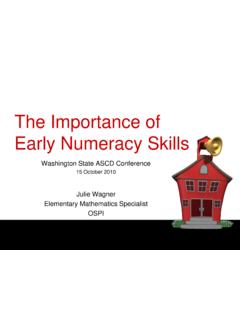

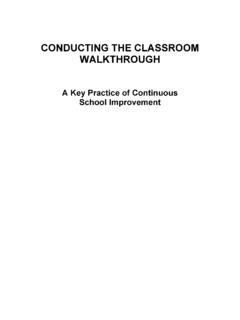
![“The Practitioner’s Best Friend” www.wsascd.org Z] …](/cache/preview/f/c/d/b/f/3/5/9/thumb-fcdbf359eb2feebe2b0d0b5ec4c6aede.jpg)

